Fashion of Lebanon and Lebanese Designers | Abed Mahfouz
The fashion of Lebanon has a long history, says Abed Mahfouz, one of the top fashion designers of Lebanon and Middle East. Lebanon is claimed to be number 3 in terms of Haute Couture Fashion Design in the world. Abed Mahfouz brand offers luxurious dresses of different types in the price range of up to $100,000.
Interview with Abed Mahfouz, Fashion Designer from Lebanon
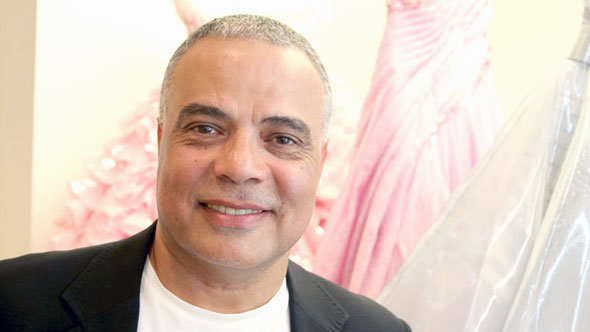
I began to work in fashion thirty years ago with my mother and sister. Starting in 1982, I worked in my mother’s house tailoring bridal gowns and selling them. The problem I had with this situation was that no one wanted to improve or take further steps in the business, which is why I started to work on my own. After ten years, I decided to start all over again independently and create my own brand under my name. This is how the Abed Mahfouz brand began.
In about 2000, I decided to go to Milan to showcase my work with a group of designers from Lebanon as well as an Italian designer. After that time, I moved to Rome on my own and participated in the official fashion week which is called the AltaRoma Fashion Week. Up to the present day, we have continued to showcase our Couture Spring/Summer and Fall/Winter collections during Alta Roma Fashion Week.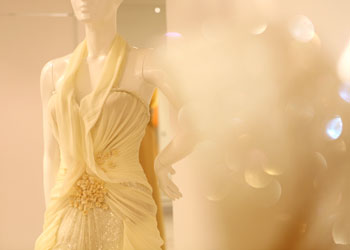
We also launch a Bridal Collection twice a year, which we shoot in Rome; the location varies depending on the mood of the collection and of course the weather!
My son Hassan is 32 years old and he is a great guy. He is the one who has worked to re-vamp the entire company – to change the brand image, website and logo. He is also now the CEO of the ready-to-wear line.
Was it a difficult journey from nothing to where you are now?
No, it has not been a difficult journey because I love my job very much. My son always asks me how I got to where I am today and I tell him I love my job, I love my clients and I am extremely detail-oriented and only satisfied if the work is done perfectly. Perfectionism is the name of the game! This is what has helped get me to where I am today. Had I let things flow without any form of inspection the brand would not have developed as much as it has today. I want every little detail to be right.
Because I started this company all on my own it was more or less a one-man show. My son began working with me four or five years ago. People have asked how did you manage to do it all on your own? I still do not have the answer! But one thing I can say is without the help of the international and local press and of course my wonderful tailors I would not have been able to do it all on my own.
Although I disagree now with not acknowledging the need for a marketing, communication or sales department when I first started. Things today are totally different – I have my son, along with a marketing department, sales department, designers, directors, etc. I love the synchronization between all departments, without them I would not been able to cope.
In terms of Haute Couture Fashion Design worldwide, Paris is number one, Rome is number two and supposedly Lebanon is number three.
However, one major problem is that Lebanon is politically and economically instable so this greatly affects the local jobs and businesses and makes it very difficult to move companies forward or expand. We have worked to overcome these obstacles but we would have had an even bigger presence internationally if we were not faced with these obstacles.
Most of my clients are not from Lebanon, but are from the Gulf area. They are very loyal and they trust me. They place orders for a Couture dress over the phone, I admire this trust worthy relationship I have with my clients, it is what keeps me going. For example, I have a client in Qatar who wanted a rushed dress for the henna night before her wedding so I sent her a few sketches and textile samples and we executed the entire dress all via phone calls and emails. Of course, we had to try the dress before the event only for the sake of reassurance.
The price for an evening dress ranges from $20,000 up to $34,000. There are two lines of wedding dresses; one line is simple and starts at $20,000 to $25,000. The bridal couture dresses range from $50,000 to $100,000. In our ready-to-wear line, the evening dresses are in the range of $5,000 to $8,000.
What challenges do you face and how competitive is the fashion industry in Lebanon?
When you begin a new fashion business, the problem is that everyone wants to put you out of business or copy you. 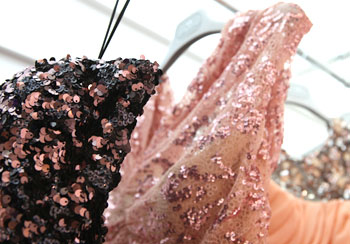 I remember I had a fashion show on LBC TV and I had arranged to have it shown every Friday at a certain time. Due to the intense competition and established brands, my competitors made a deal with LBC to show their video and promotion instead of mine. But it does not bother me anymore; that was in the past and I am happy with where I am today.
I remember I had a fashion show on LBC TV and I had arranged to have it shown every Friday at a certain time. Due to the intense competition and established brands, my competitors made a deal with LBC to show their video and promotion instead of mine. But it does not bother me anymore; that was in the past and I am happy with where I am today.
On March 27, 2000, the Phoenicia Hotel opened in Lebanon and I had a fashion show there only three days after it opened which was an important achievement. Due to my international presence my motivation and confidence to continuously grow is always avid.
Abed Mahfouz is still primarily a regional brand and not a global one. For example, you do not yet compete with Chanel or other big industry heavyweights. What sorts of challenges are you facing, such as in financing, branding or recognition, as you work towards global expansion?
Financially, I started the business on my own from my savings and I am still quite independent and do not have a partner. My son Hassan would like to bring someone in to help the company and myself. He has more of a global and modern approach and he is looking into having an investor or partner in order to overcome the financial obstacles that are in the way of reaching the level of the industry’s heavyweights. The only thing stopping this is my worry about having someone else other than my son involved and losing my autonomy. I do not trust anyone else other than my son. However, all of the other big name designers have financial partners already.
Before Hassan started to work with me five years ago, I had a lot more fear of involving someone else. Now that I have someone to trust other than myself, I am more comfortable with bringing in a third or fourth party for investments or partnerships. I have had a number of these requests in the past.
Previously, I had a small showroom and workshop on Hamra Street, which used to be the most popular location in town. 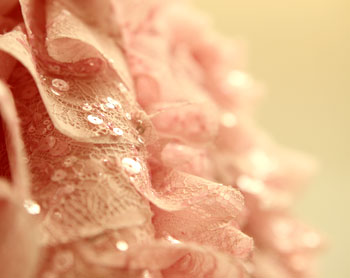 Then, two years ago we moved to our current downtown location, which is very central and expensive. I did this all on my own. People told me I am crazy; there are so many expenses with rent and property taxes – but I do not care and it has been very worthwhile. I did not want any financial help with this move. I believe that the Hamra location was lucky for me, it brought in many clients and it was a stepping-stone to my career.
Then, two years ago we moved to our current downtown location, which is very central and expensive. I did this all on my own. People told me I am crazy; there are so many expenses with rent and property taxes – but I do not care and it has been very worthwhile. I did not want any financial help with this move. I believe that the Hamra location was lucky for me, it brought in many clients and it was a stepping-stone to my career.
We like to keep our niche within the high society of various countries because they are the ones who are willing to pay and understand the value of what we do. So no matter what is happening politically, we can approach them and travel to them to make it work.
Right now we could use a financial partner to help with the income and I think it would be the best plan for future.
We do not see fashion being developed in Jordan, Egypt, Libya, Dubai, Syria or Bahrain. Lebanon is certainly special and is on par with designers in Italy and France. Why do you feel that Lebanon is such a fashion hub?
In terms of Haute Couture Fashion Design worldwide, Paris is number one, Rome is number two and supposedly Lebanon is number three. Lebanon is a country colonized by the French and the Lebanese were very much in touch with and learned a lot from the French culture. This country had the chance to see what was happening in Europe and to learn from them, which is why the fashion design world was born here. However, when you look at countries such as Syria, Jordan and Egypt, you do not see an interaction with fashion only because they were not offered what the French offered us in terms of fashion.
The same thing could be said for Morocco and France, or even East Africa, so there must be something special about Lebanon.
It is the close relationship that they built that is different. But as well, no one admires or studies fashion like the Lebanese do in this region. 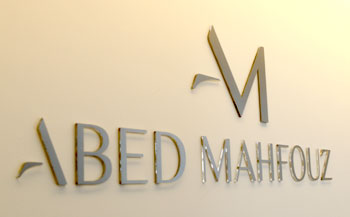 We are less conservative and more open-minded than others in the region and because of these attributes we are not only successful in fashion but in many sectors such as food and beverage and banking. Nobody would think of going to Jordan or Syria to find a fashion designer.
We are less conservative and more open-minded than others in the region and because of these attributes we are not only successful in fashion but in many sectors such as food and beverage and banking. Nobody would think of going to Jordan or Syria to find a fashion designer.
The original Lebanese tailors can be credited with giving birth to this industry many years ago. These include Showaiter, Pierre Katra, Hanna Touma and Madame Salha. These big tailors used to get clients from many VIP and royal clients from various countries so it became a tradition. Now I work with many royal families in Qatar, Bahrain and UAE. Going back to the people I just mentioned, they are tailors and not designers. The notion of having a fashion house and brand only started developing in Lebanon about fifteen or twenty years ago. Now there are twenty or twenty-five well-known names in fashion here.
As well, the Lebanese are known to be excellent craftsmen and especially in embroidery. This is why you see a lot of handmade embroidery in Lebanese designs. You do not see this talent in any other Middle Eastern countries; it is really centered in Lebanon. This is why other designers who are elsewhere in the region look out for Lebanese tailors because they do have a special talent. This goes back to how they learned their craft and adapted it. This is exactly how it was for me.
Also, Lebanon is a service oriented country; I know exactly what the client needs, what type of fabric the client likes from my first glance, and if she wants a private collection instead of what is in every fashion show. Our expertise relies on learning what the client wants without bombarding the client with neither questions nor being adamant. This is not solely applicable to designers, but the Lebanese people in general are very service-oriented and accommodating and they always make it easier for their clients. The client does not need to go through problems, issues and phone calls; we are always there to provide what the client wants.
Customers in the Gulf area particularly enjoy personal and friendly service more than in Europe. I visited fashion houses and boutiques and nobody said hello. But here it is easy, comfortable and welcoming for the clients.
What makes you one of the top five designers? What is that something special which really sets Abed Mahfouz brand apart from others? What is the secret of its success?
It is not a secret. I could sum it with the saying “when there’s a will, there’s a way”. I love my job, I am very involved in everything including the small details and I have direct contact with the clients. Whether it is an individual client or for a larger group such as a department store who would like me to attend an event, I always go myself. This allows me to keep a very personal relationship with my clients, which has been one of the most important pillars of my business. If I was always behind closed doors and no one ever saw me, I would not have been as successful as I am today. The other component is my detail-oriented nature – I am very meticulous and nothing leaves my shop without being 100 percent correct and finished.
I always tend to bring in and recruit young designers and directors to keep a young and fresh spirit in the brand. This allows me to always offer my clients new and fashion forward styles and looks.